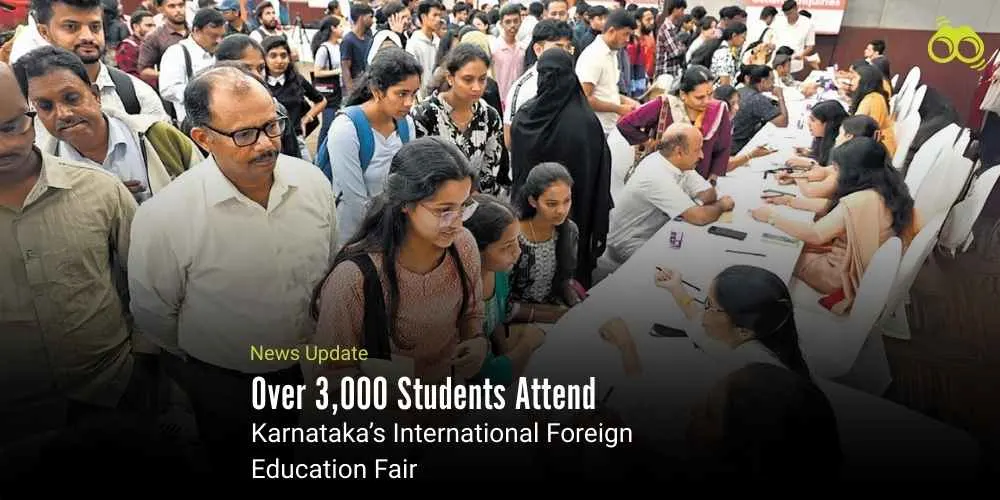State Education Policy Gains Global Push with International Fair
Scholarships Worth Crores Announced for Karnataka Students Abroad
The Karnataka Vocational Training and Skill Development Corporation (KVTSDC) is a state-run body committed to enhancing employability through targeted skill development, vocational training, and global education initiatives. Operating under the Department of Skill Development, Entrepreneurship, and Livelihood, KVTSDC plays a pivotal role in bridging the gap between education and industry by facilitating access to international learning platforms and career pathways. Through strategic partnerships and inclusive programming, the Corporation aims to equip Karnataka’s youth with the competencies required for a competitive global workforce.
As part of its internationalisation efforts, KVTSDC organised an International Education Fair in Bengaluru on Sunday, drawing significant interest from students aspiring to pursue higher education abroad. According to officials, over 3,000 Indian students attended the event, engaging directly with representatives from foreign universities and exploring a diverse range of academic opportunities. The fair was positioned as a key component of the state’s broader strategy to expand educational access and connect students with reputed institutions overseas.
This initiative aligns with Karnataka’s evolving State Education Policy 2025, which emphasises multilingual instruction, vocational pathways, and global exposure. In tandem, the government is investing in infrastructure upgrades, launching 13 new technical institutions, and expanding public school access to strengthen foundational readiness for international education. Speaking at the event, Minister for Skill Development, Entrepreneurship, and Livelihood, Sharan Prakash R Patil, reiterated the State Government’s commitment to providing students with improved access to global learning platforms. He noted that first-hand exposure to international academic environments would empower young people to make informed decisions about their futures. The Minister also expressed satisfaction at the enthusiastic response from both students and parents, who welcomed the initiative’s transparency and accessibility.
A major highlight of the fair was the announcement of international scholarships. The University of Western Australia (UWA) declared funding worth AUD 48,000 for undergraduate students and AUD 24,000 for postgraduate students under its Global Excellence Scholarship programme. UWA’s Deputy Vice Chancellor, Guy Littlefair, commended Karnataka’s proactive approach to global education and expressed eagerness to welcome students from the region. Complementing this, the University of East Anglia confirmed £5,500–£6,500 merit scholarships for Indian postgraduates, while Bangor University announced Vice-Chancellor’s Scholarships worth £10,000 and Dean’s Scholarships up to £6,000. Both institutions also pledged to offer two higher education scholarships each, covering 50 per cent of tuition fees for eligible students.
In total, over 60 international universities participated in the fair, including several ranked within the top 500 globally. Their presence underscored Karnataka’s growing reputation as a hub for globally oriented education initiatives and reflected the increasing demand for structured overseas pathways among Indian students. Beyond scholarship announcements, the fair offered comprehensive student support services, including one-on-one counselling, spot scholarship assessments, visa guidance, and financial planning sessions. Dedicated booths provided information on health insurance, accommodation, and language preparation, ensuring students were well-informed throughout the application process.
Organisers emphasised that such collaborations not only expand access to international scholarships but also reinforce Karnataka’s role in creating sustainable pathways for global education. They noted that when combined with ongoing vocational programmes, initiatives like these make overseas education more inclusive and attainable for a wider demographic. By integrating direct engagement with foreign universities and offering tangible financial support, the Education Fair positioned itself as more than a recruitment platform; it reflected a strategic shift towards linking higher education with global exposure, skill development, and long-term career outcomes. Karnataka’s integrated model, anchored in financial aid, institutional partnerships, and post-departure support, may well serve as a blueprint for other Indian states seeking to internationalise education access with equity and intent.
Editor’s Note
The International Education Fair held by the Karnataka Vocational Training and Skill Development Corporation (KVTSDC) is more than just an event. It reflects the state’s serious effort to open global learning opportunities to a wider group of students. With over 3,000 young people taking part and more than 60 foreign universities offering information and scholarships, the fair showed how international education can be made more accessible. The range of scholarships from universities in Australia and the United Kingdom highlighted both the demand for Indian students and the value of Karnataka’s role in linking them to these opportunities. The fair also ties directly to the State Education Policy 2025, which places equal focus on local languages, vocational education, and overseas exposure. By building new technical institutions, improving school access, and encouraging global connections, the government is trying to prepare students for both local jobs and international careers. The scheme's transparency is a key differentiator. It builds student confidence and lessens reliance on private agents through complementary counselling, straightforward guidance, and support after departure. This publicly-driven approach enhances the fairness and trustworthiness of the entire process.
Skoobuzz underlines that Karnataka is showing that global education should not be seen as a privilege for a few but as an opportunity for many. If followed carefully, this approach could guide other Indian states in building inclusive and transparent systems.














0 Comments (Please Login To Continue)